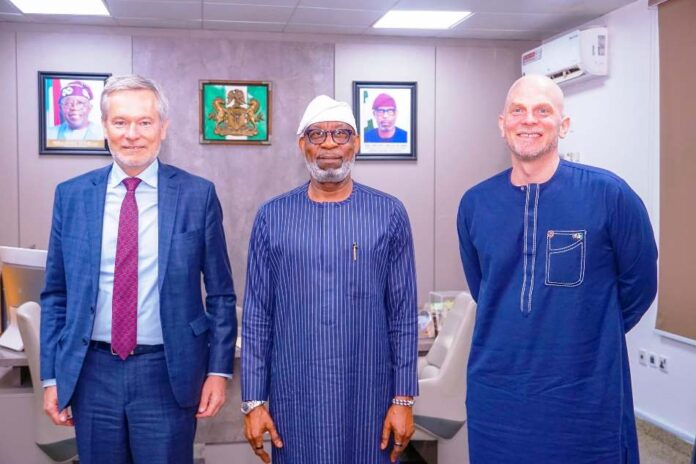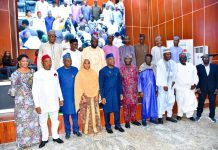The European Union has expressed keen interest in expanding trade and investment of member countries to Nigeria’s solid minerals sector.
European Ambassador to Nigeria and ECOWAS, HE Gautier Mignot disclosed this during a courtesy visit to the Minister of Solid Minerals Development, Dr. Dele Alake.
Ambassador Mignot commended ongoing efforts to reposition Nigeria’s mining sector, noting that the EU delegation seeks to better understand the industry and explore areas of mutual interest and collaboration.
Responding, Dr. Alake emphasized Nigeria’s readiness to engage with EU member states and investors to unlock the vast potential of her solid minerals for shared prosperity. “Given our history and the cordial relationship we’ve maintained with the EU, the time is ripe to map out concrete plans and translate them into actionable projects within the solid minerals sector,” he stated.
Highlighting Nigeria’s wealth of critical minerals, the Minister pointed to the abundance of high-grade lithium—an essential component in solar panels, electric vehicles, and battery production. He further described Nigeria as a hub for minerals critical to the global shift toward green energy.
“We have lithium, cobalt, copper, and more—all in commercially viable quantities. Nigeria is deepening exploration this year to discover more. Even within the limited areas explored so far, we’re looking at over $700 billion in mineral deposits. This represents a massive investment opportunity, and we encourage EU investors to take advantage of it,” Dr. Alake added.
To attract investments, the Minister outlined several incentives, including tax waivers on mining equipment, policies allowing full repatriation of profits, enhanced security through dedicated mining marshals, and streamlined licensing processes. He stressed that local value addition remains a prerequisite for issuance of mining licenses to prospective investors.
“Any serious investor that intends to invest in our sector must have concrete plans for local value addition because that is the only way we can really ignite the potential of our local economy, create multiplier effect that will generate employment, technological transfer and beneficiation”, Dr. Alake asserted.
Hinting at the Federal Government’s new approach towards sustainability and traceability of minerals extracted from the country, the minister revealed that mechanisms are being put in place to track minerals mined from the country, whether raw, semi-processed or finished minerals. He emphasized that Nigeria is committed to ensuring that minerals exported from the country are traceable, stressing that government is tightening the noose on those responsible for carting away illegally mined minerals.
He said, “If we put in place mechanisms with the cooperation of other nations, we can reduce to the barest minimum incidences of our minerals surfacing in unauthorized hands. For instance, some people can smuggle lithium out and manufacture something that may not even be beneficial to the host country and to us.”
Outlining mechanisms already in place, the minister pointed out on-going pre-shipment inspections, satellite imaging underway to monitor activities from the mine pit to the port or processing factory amongst others, welcoming collaboration from the EU to boost reforms and build a more transparent, investor-friendly mining sector.”
Ambassador Mignot assured the Minister that the EU would consult with member states and encourage European companies to explore partnership opportunities in Nigeria’s solid minerals space, noting the EU’s shared commitment to sustainable and mutually beneficial trade relationships.
Signed
Segun Tomori, FSCA
Special Assistant on Media to the Honourable Minister of Solid Minerals Development.
15th April, 2025.






